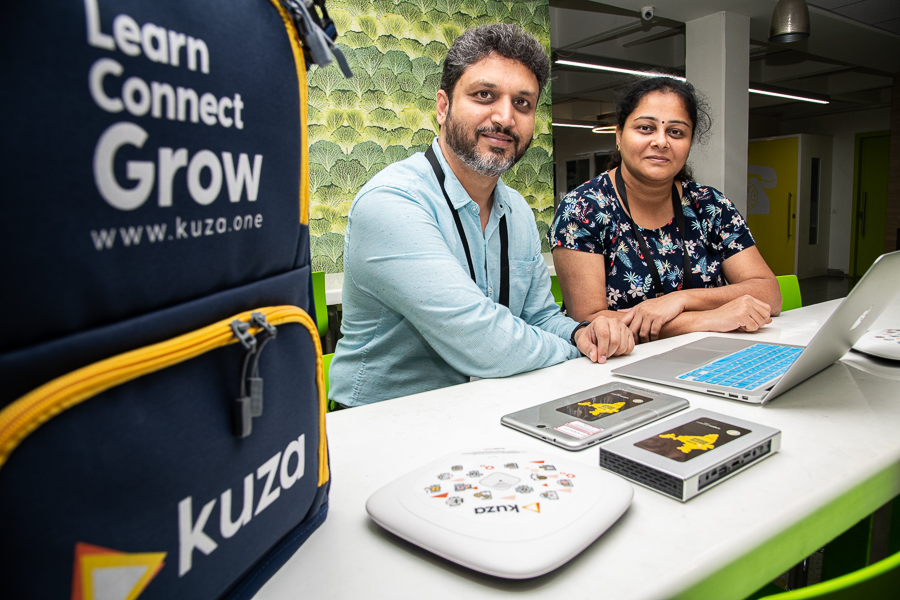Democratizing data
The iHub incubator at the International Crops Research Institute for the Semi-Arid Tropics (ICRISAT) in Hyderabad is working to truly “democratize data”.
This blog is an effort of the Data-Driven Agronomy Community of Practice to highlight CGIAR’s digital extension work.
Ram Dhulipala is onto a powerful thing. As the leader of the iHub incubator at the International Crops Research Institute for the Semi-Arid Tropics (ICRISAT), the iHub in Hyderabad, he works every day to “democratize data”.
The stylish iHub at ICRISAT is a digital incubator. Tech start-ups, researchers, private sector companies and government officials meet and share information related to agriculture and extension, sharing ideas about how to reach farmers more effectively.
“Start-ups personalize services for individuals like farmers,” says Dhulipala, who also has background in software development. “Traditionally this was a heavy investment. But in the age of cloud computing, large companies like IBM or Amazon are democratizing computer power and big data analytics, giving smaller start-ups operating on the front line with farmers opportunities.”
These trends have coincided with others, Dhulipala has observed. Big companies are starting to think about farmers as long-term customers rather than one-off buyers. And, there is a growing global focus on tackling climate change and improving food security.
“At the iHub, we bring together those solving local problems, with large organizations like IBM or Google, who can facilitate and lower the cost of accessing specific data, like satellite information, so smaller organizations can afford it.”
“A lot of companies are starting to wake up to the possibility of digital innovation in agriculture, where there has previously been stagnation,” he added. “They realize that to reach the last mile, you also need smaller start-ups.”
Reaching the last mile
There are of course challenges to navigate. For some Fintech investors for example, returns in agriculture are often too slow, taking one to two years in seasonally-based agriculture to see tangible investment returns, rather than six months in other sectors.
But at the iHub, there are plenty of examples of enterprising start-ups that are not only reaching farmers, they are leading examples of the ways in which researchers and tech start-ups can work together to improve digital extension.
One such example is KUZA, a social technology enterprise which today delivers 40,000 two or three-minute video segments of information to 310,000 smallholder farmers on topics from agronomy skills to entrepreneurship and life skills.
KUZA makes microlearning video content and outreach services accessible via Cloud and mobile apps, and its learning, distribution and mentoring platforms are designed to work online and off-grid.
Working together with ICRISAT, KUZA have reached communities across Africa and Asia, providing digital extension services in agriculture to smallholder farmers who typically earn two to four USD per day.
“We involve communities to bring them collective wisdom leading to commerce,” said Bharathi Bharatam, KUZA co-founder with her husband Sriram Bharatam. The duo spotted a number of trends, and decided to make the most of them.
The first was the growing penetration of the internet, coupled with the reducing cost of bandwidth, and then, the hunger and eagerness of people to learn, connect and grow.
“On one hand people could not afford to spend a lot of money on learning,” explained Sriram. “But on the other, we saw that both the rich and the poor were becoming ‘time poor’. We saw a need, and KUZA was born.”
KUZA means ‘grow’ in Swahili,” with the aim of making learning accessible to people on-demand, in context, on their own terms and at their own convenience. “Our aim is to treat smallholder farmers like micro-entrepreneurs, helping them diversify and improve their incomes,” said Sriram.
Knowledge is power
The social entrepreneurs have come a long way since they started their idea. It began back in 1999, following the devastating Orissa super cyclone in India. “We wanted to support cyclone victims. Millions lost their livelihoods and more than 100,000 lost lives,” recalls Sriram.
“If each Indian could donate one cent, we could contribute millions. The couple created the Cause an Effect campaign, galvanizing 18 million people around the world to raise US$ 1.5 million in less than 45 days.
Working with ICRISAT scientists and others to bring quality information to more than 4 million young people and 750,000 women, KUZA has advanced careers through business mentorship, and ideas about access to inputs, credit and markets.
Rural agents who work with groups of 100-150 smallholder farmers, use an offline digital kit to create a 40 meter-range hot spot, so that the community can learn about timely best practices.
Bharathi, who heads the Learning and Development practice, regularly meets experts like those at ICRISAT, to demystify complex topics and package them into a simple format that anyone can understand – an example of the iHub’s success in bringing people together to truly democratize data.
April 6, 2020
Georgina Smith
Contributing writer
Related posts
Latest news





